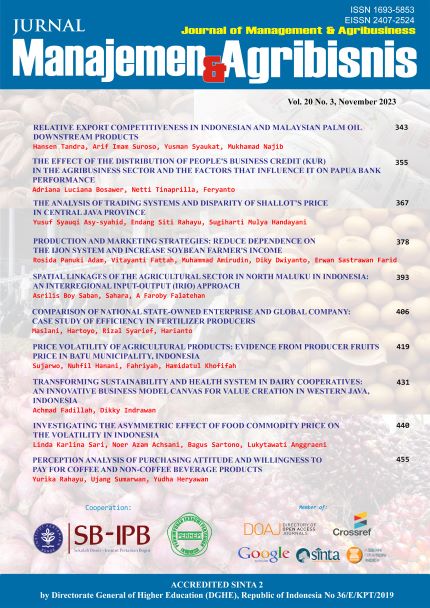Business Development Strategy for Smart Watering Product of PT. Hidroponik Padjadjaran Indonesia
Abstract
The urban hydroponic cultivation trend presents a promising opportunity for the advancement of hydroponic agro-industry within Indonesia. This phenomenon has been catalyzed by the innovation of the Smart Watering hydroponic kit introduced by PT. Hidroponik Padjadjaran Indonesia. The Smart Watering system, founded on the principles of self-watering irrigation and electricity-free operation, has unlocked new possibilities in hydroponic agriculture. This study aims to assess the formulation of strategic initiatives for the sustainable growth and continuity of Smart Watering business operations. Employing qualitative and quantitative research techniques, including IFE-EFE, BMC-SWOT, and AHP analyses, the investigation reveals that the IFE matrix scores 2.11, while the EFE matrix scores 2.70, positioning the company in quadrant V. Subsequently, a BMC-SWOT analysis identifies twelve potential strategies, which are further evaluated through AHP analysis to determine priority strategies. The findings underscore market penetration (0.689) as a key strategic criterion, with the top-priority strategy, W02 (0.156), emphasizing active engagement with local and regional hydroponic communities to foster network expansion and enhance human resource competencies. These findings provide a foundation for the implementation of growth and sustainability strategies in hydroponic agro-industry enterprises.
Keywords: Business Development Strategy, Hydroponic, IFE-EFE, BMC-SWOT, AHP
Authors
Authors who publish with this journal agree to the following terms:
- Authors retain copyright and grant the journal right of first publication with the work simultaneously licensed under a Creative Commons Attribution License that allows others to share the work with an acknowledgement of the work's authorship and initial publication in this journal.
- Authors are able to enter into separate, additional contractual arrangements for the non-exclusive distribution of the journal's published version of the work (e.g., post it to an institutional repository or publish it in a book), with an acknowledgement of its initial publication in this journal.
- Authors are permitted and encouraged to post their work online (e.g., in institutional repositories or on their website) prior to and during the submission process, as it can lead to productive exchanges, as well as earlier and greater citation of published work (See The Effect of Open Access).

